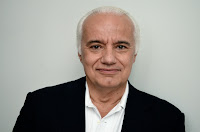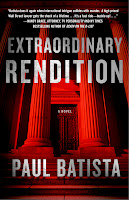Blog Tour: Excerpt from Extraordinary Rendition by Paul Batista
Greetings fair readers. Today I am excited to be posting an excerpt for Extraordinary Rendition by Paul Batista. Hope y'all will enjoy the excerpt.
About the author:
Extraordinary Rendition by Paul Batista, May 1, 2013. Published by Astor + Blue Editions LLC
Amazon | B&N |
About the author:
Paul Batista, novelist and television personality, is one of the most widely known trial lawyers in the country. As a trial attorney, he specializes in federal criminal litigation. As a media figure, he is known for his regular appearances as guest legal commentator on a variety of television shows including, Court TV, CNN, HLN and WNBC. He’s also appeared in the HBO movie, You Don't Know Jack, starring Al Pacino.
A prolific writer, Batista authored the leading treatise on the primary federal anti-racketeering statute, Civil RICO Practice Manual, which is now in its third edition (Wiley & Sons, 1987; Wolters Kluwer, 2008). He has written articles for The New York Times, The Wall Street Journal, and The National Law Journal.
Batista's debut novel, Death's Witness, was awarded a Silver Medal by the Independent Book Publishers Association (IBPA). And his new novel, Extraordinary Rendition, is now being published—along with a special reissue of Death’s Witness—by Astor + Blue Editions.
Batista is a graduate of Bowdoin College, where he was elected to Phi Beta Kappa, and Cornell Law School. He’s proud to have served in the United States Army. Paul Batista lives in New York City and Sag Harbor, New York.
AN EXCERPT FROM CHAPTER 1 OF EXTRAORDINARY RENDITION BY PAUL BATISTA
When the guard left, the iron door resonated briefly as the magnetic lock engaged itself. Byron sat in a steel folding chair. Directly in front of him was a narrow ledge under a multi-layered, almost opaque plastic window, in the middle of which was a metal circle.Ali Hussein seemed to just materialize in the small space behind the partition. Dressed in a yellow jumpsuit printed with the initials “FDC” for “Federal Detention Center,” Hussein, who had been described to Byron as an accountant trained at Seton Hall, in Newark, was a slender man who appeared far more mild-mannered than Byron expected. He wore cloth slippers with no shoelaces. The waistband of his jump suit was elasticized—not even a cloth belt. He had as little access to hard objects as possible.He waited for Byron to speak first. Leaning toward the metal speaker in the partition and raising his voice, Byron said, “You are Mr. Hussein, aren’t you?”The lawyers at the Civil Liberties Union who had first contacted Byron told him that, in their limited experience with accused terrorists, it sometimes wasn’t clear what their real names were. There were often no fingerprints or DNA samples that could confirm their identities. The name Ali Hussein was as common as a coin. It was as though genetic markers and their histories began only at the moment of their arrest.
“I am.” He spoke perfect, unaccented English. “I don’t know what your name is.”The circular speaker in the window, although it created a tinny sound, worked well. Byron lowered his voice. “I’m Byron Johnson. I’m a lawyer from New York. I met your brother. Did he tell you to expect me?”“I haven’t heard from my brother in years. He has no idea how to reach me, I can’t reach him.”“Has anyone told you why you’re here?”“Someone on the airplane—I don’t know who he was, I was blind-folded—said I was being brought here because I’d been charged with a crime. He said I could have a lawyer. Are you that lawyer?”“I am. If you want me, and if I want to do this.”All that Ali’s more abrasive, more aggressive brother had told Byron was that Ali was born in Syria, moved as a child with his family to Lebanon during the civil war in the 1980s, and then came to the United States. Ali never became a United States citizen. Five months after the invasion of Iraq, he traveled to Germany to do freelance accounting work for an American corporation for what was scheduled to be a ten-day visit. While Ali was in Germany, his brother said, he had simply disappeared, as if waved out of existence. His family had written repeatedly to the State Department, the CIA, and the local congressman. They were letters sent into a vacuum. Nobody ever answered.
Byron asked, “Do you know where you’ve come from?”“How do I know who you are?”Byron began to reach for his wallet, where he stored his business cards. He caught himself because of the absurdity of that: he could have any number of fake business cards. Engraved with gold lettering, his real business card had his name and the name of his law firm, one of the oldest and largest in the country. Ali Hussein was obviously too intelligent, too alert, and too suspicious to be convinced by a name on a business card or a license or a credit card.
“I don’t have any way of proving who I am. I can just tell you that I’m Byron Johnson, I’ve been a lawyer for years, I live in New York, and I was asked by your brother and others to represent you.”Almost unblinking, Ali just stared at Byron, who tried to hold his gaze, but failed.
At last Ali asked, “And you want to know what’s happened to me?”“We can start there. I’m only allowed thirty minutes to visit you this week. Tell me what you feel you want to tell me, or can tell me. And then we’ll see where we go. You don’t have to tell me everything about who you are, what you did before you were arrested, who you know in the outside world. Or you don’t have to tell me anything. I want nothing from you other than to help you.”Ali leaned close to the metallic hole in the smoky window. The skin around his eyes was far darker than the rest of his face, almost as if he wore a Zorro-style mask. Byron took no notes, because to do so might make Ali Hussein even more mistrustful.
“Today don’t ask me any questions. People have asked me lots of questions over the years. I’m sick of questions.” It was like listening to a voice from a world other than the one in which Byron lived. There was nothing angry or abusive in his tone: just a matter-of-fact directness, as though he was describing to Byron a computation he had made on one of Byron’s tax returns. “One morning five Americans in suits stopped me at a red light. I was in Bonn. I drove a rented Toyota. I had a briefcase. They got out of their cars. They had earpieces. Guns, too. They told me to get out of the car. I did. They told me to show them my hands. I did. They lifted me into an SUV, tied my hands, and put a blindfold on me. I asked who they were and what was happening.”He paused. Byron, who had been in the business of asking questions since he graduated from law school at Harvard, couldn’t resist the embedded instinct to ask, “What did they say?”“They said shut up.”“Has anyone given you any papers since you’ve come here?”“I haven’t had anything in my hands to read in years. Not a newspaper, not a magazine, not a book. Not even the Koran.”“Has anyone told you what crimes you’re charged with?”“Don’t you know?”“No. All that I’ve been told is that you were moved to Miami from a foreign jail so that you could be indicted and tried in an American court.”There was another pause. “How exactly did you come to me?” Even though he kept returning to the same subject—who exactly was Byron Johnson?—there was still no hostility or anger in Ali Hussein’s tone. “Why are you here?”In the stifling room, Byron began to sweat almost as profusely as he had on the walk from the security gate to the prison entrance. He recognized that he was very tense. And he was certain that the thirty-minute rule would be enforced, that time was running out. He didn’t want to lose his chance to gain the confidence of this ghostly man who had just emerged into a semblance of life after years in solitary limbo. “A lawyer for a civil rights group called me. I had let people know that I wanted to represent a person arrested for terrorism. I was told that you were one of four prisoners being transferred out of some detention center, maybe at Guantanamo, to a mainland prison, and that you’d be charged by an American grand jury rather than held overseas indefinitely. When I got the call I said I would help, but only if you and I met, and only if you wanted me to help, and only if I thought I could do that.” “How do I know any of this is true?”Byron Johnson prided himself on being a realist. Wealthy clients sought him out not to tell them what they wanted to hear but for advice about the facts, the law and the likely real-world outcomes of whatever problems they faced. But it hadn’t occurred to him that this man, imprisoned for years, would doubt him and would be direct enough to tell him that. Byron had become accustomed to deference, not to challenge. And this frail man was suggesting that Byron might be a stalking horse, a plant, a shill, a human recording device.“I met your brother Khalid.”“Where?”“At a diner in Union City.”“What diner?”“He said it was his favorite, and that you used to eat there with him: the Plaza Diner on Kennedy Boulevard.”Byron, who for years had practiced law in areas where a detailed memory was essential, was relieved that he remembered the name and location of the diner just across the Hudson River in New Jersey. He couldn’t assess whether the man behind the thick, scratched glass was now more persuaded to believe him. Byron asked, “How have you been treated?”“I’ve been treated like an animal.”“In what ways?”
Extraordinary Rendition by Paul Batista, May 1, 2013. Published by Astor + Blue Editions LLC
When Ali Hussein—suspected terrorist and alleged banker for Al Qaeda—is finally transported from Gitmo to the US mainland to stand trial, many are stunned when Byron Carlos Johnson, pre-eminent lawyer and the son of a high-profile diplomat, volunteers as counsel. On principle, Johnson thought he was merely defending a man unjustly captured through Rendition and water-boarded illegally. But Johnson soon learns that there is much more at stake than one man’s civil rights.You can purchase Extraordinary Rendition at-
Hussein’s intimate knowledge of key financial transactions could lead to the capture of—or the unabated funding of—the world’s most dangerous terror cells. This makes Hussein the target of corrupt US intelligence forces on one side, and ruthless international terrorists on the other. And, it puts Byron Carlos Johnson squarely in the crosshairs of both.
Pulled irresistibly by forces he can and cannot see, Johnson enters a lethal maze of espionage, manipulation, legal traps and murder. And when his life, his love, and his acclaimed principles are on the line, Johnson may have one gambit left that can save them all; a play that even his confidants could not have anticipated. He must become the hunter among hunters in the deadliest game.
Written by no-holds-barred-attorney Paul Batista, Extraordinary Rendition excels not only as an action thriller, but as a sophisticated legal procedural as well; tearing the curtains away from the nation’s most controversial issues.
Provocative. Smart. Heart-pounding. A legal thriller of the highest order.
Amazon | B&N |




Comments
Post a Comment
All comments are moderated! Let's keep it clean, y'all!